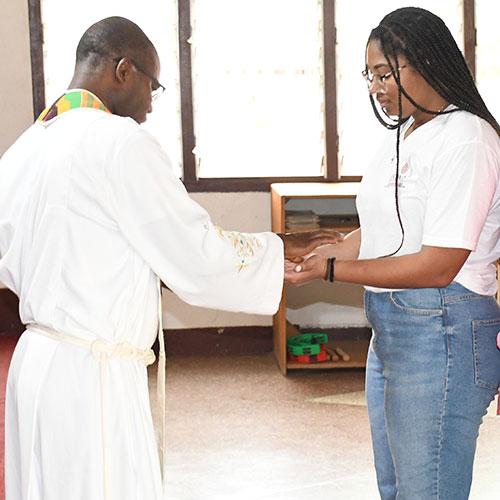Locating Housing Tips
Tips for Finding the Right Apartment
- Know your budget - you can't live somewhere if you can't afford it.
- Create a wants/needs list before you start your search (i.e. walk to campus, one bedroom, close to bus, parking spot, etc.).
- Decide if you need or want a roommate and have a serious conversation with your roommate(s) about your expectations for each other.
- Meet the management of your potential apartment/property and take a tour of the apartment.
- Knock on doors of current residents and neighbors and ask questions about the property's management and the neighborhood.
- Visit the neighborhood during the day and at night to see if it's quiet and safe.
- Look for safety features: doors visible from the road, doors have deadbolts, locks work, well lit at night, grounds maintained, smoke alarms, carbon monoxide detectors, fire extinguishers.
- Check all appliances to make sure they are in working condition.
- Check the bathroom and plumbing and pay attention to water stains on the ceiling, water pressure, etc.
- Make sure there is enough storage for your belongings.
Flood, fires, and theft can occur in your off-campus residence. Some landlords will require you to maintain rental insurance. Even if they do not, you may want to consider purchasing it!
What is rental insurance?
Rental insurance provides important coverage for you and your possessions. It will allow you to be reimbursed if your property is vandalized, stolen, or damaged. The specific property covered should be listed in the policy's coverage. One policy should cover all renters in a unit. Rental insurance typically also covers liability if someone is injured in your apartment as well as property. And it may cover temporary living expenses if your rental is damaged.
Often policies will only cover up to a specific amount of damage. You may need to buy a rider or floater to insure additional coverage. For example, you may need to purchase a rider if the value of your jewelry or computer goes over the specified amount. Make sure you let your insurance agent know about your expensive items so you can recover the loss if something happens.
Several types of insurance policies exist. A comprehensive policy contains:
- Fire or lightning
- Windstorm or hail
- Explosion
- Riot or civil commotion
- Aircraft
- Vehicles
- Smoke
- Vandalism or mischief
- Theft
- Damage by glass or safety-glazing from part of a building
- Falling objects
- Water-related damage from home utilities
- Electrical surge damage
You will need to purchase additional riders for flood, earthquake, or hurricane coverage if you live in an area prone to these.
You will want to ask your insurance company if they offer actual cash value or replacement cost coverage. ACV coverage only replaces what the value of the item is at the time it is damaged. RCC will pay the price of replacing the item. Both of these payments will be less the cost of the deductible. If you have a $500 deductible, the insurance company will replace the cost of your losses less $500. Often raising your deductible will lower the cost of the bill. Just make sure you can afford the deductible in the event of an emergency.
If you decide you need rental insurance:
- Check your parents homeowners insurance to see if you are still covered under it.
- Check to see if your car insurance or medical insurance company will give you a discount if you insure multiple policies with them!
- Shop around to get the best deal. National Student Services, Inc. is one possible source for rental insurance.
Insurance Company Questions
The insurance company may ask you questions to help determine the cost of your rental insurance coverage:
- How old is the building you will be living in?
- What is the building made of (brick, wood, steel)?
- How many floors and units are in the building?
- Where is the nearest hydrant? Firehouse?
- What type of security or security system does your dwelling offer?
- What kinds of locks does your dwelling have?
- Do you have a fire extinguisher?.
- Does your dwelling have a sprinkler system?
Rental insurance is typically a small fee each month. It can be very helpful if something happens to your dwelling in an emergency
To be truly ready to move off-campus you must prepare a budget of your monthly expenses. Fill out a budget to decide if you can afford to move off-campus and/or to decide how much you will need to cover your costs each month. You certainly cannot choose the right place to live until you know how much you can spend on rent, utilities, transportations, and insurance.
Here are some other things to consider when choosing an off-campus dwelling:
- Some apartments have complex maintenance fees. Ask about these costs upfront.
- Most apartments require a security deposit in addition to the first months rent (and sometimes last month's rent).
- Some landlords will require an application fee and/or a credit check fee.
- Some utility companies may require a security deposit to set up electric/gas or water services.
- Request the last few months utility bills from your landlord before signing the lease. He/she is required by law to give them to you.
- If pets are permitted, a pet often requires a pet deposit in addition to the security deposit. You also need to factor in monthly food, medical, and grooming costs. Pet medical insurance is available, but it can be costly.
- Find out the cost of rental insurance before moving into an apartment if you are not covered under you parents home owners insurance.
- Factor in the cost of moving. Supplies such as boxes and tape can add up. Also consider the cost of a mover, a rental truck, gas, shipping, etc.
- Many off-campus apartments are not furnished. Add in the cost of dishes, silverware, a television, carpets, appliances, furniture, towels, etc.
Security Deposit
Landlords have the right to collect a security deposit at the initial renting of the apartment. Usually the security deposit equates to one month's rent. The deposit must be kept in an interest bearing bank in New York State. If you renew a lease and the rent increases, a landlord has the right to ask you for additional money to add to the security deposit. Most of the time landlords will not let you use the security deposit for the last month's rent. The landlord is required to inform you in writing how your deposit is being held, where it is held, and whether you will receive interest on it!
Follow the requirements in the lease to get your security deposit back. A landlord must return a security deposit whether or not a tenant asks for it, less the cost of any damage. If a landlord refuses to give the security deposit back, tenants can contact their local Office of the Attorney General (914) 422-8755.
Late Fees
If a landlord includes stipulations for late fees in your lease, he/she has a right to collect them. Typically late fees must be reasonable. A reasonable late fee is considered to be 5% of the monthly rent.
One of the most important decisions you can make as you prepare to seek off-campus housing is whom you are going to live with. This decision causes a lot of stress for many students. There are four steps you need to take in choosing your roommate. They are:
- Determine your desires and expectations in a living situation;
- Determine your potential roommate(s) desires and expectations;
- Discuss and analyze your similarities and differences with your potential roommate(s)
- Evaluate the results of your discussions, and make a decision.
In determining your living situation for next year, the following questions may help you examine your values and beliefs:
Room Type
- What type of housing do you want? Are you looking for a room in a private home, an apartment or an entire house?
- How many roommate(s) do you want?
- How many people do you want in your living unit? (Limit of 3 in New Rochelle)
General Responsibilities
- Do you expect the door to your apartment to be closed and locked always, only at certain times, or never?
- How important is it that your living area be neat and clean?
- How neat do you expect your roommate(s) to be?
- How often is trash emptied, the room vacuumed, the refrigerator cleaned? Who will do the chores?
Study Time
- Do you prefer to study in your room, in a study lounge, or in the library?
- Do you usually study alone or with friends?
- During what hours do you usually study in your room?
- What type of study atmosphere do you prefer? Soft music/TV, absolute quiet, or do you have no preference?
- Do you expect to pull all-nighters in the room?
- Do you like/need a lot of sleep? When?
- Can you sleep when your roommate is studying in the room?
Visitors
- Do you want your room to be generally private, the social center for the floor, or somewhat in between?
- How many visitors make a crowd?
- Everyone needs privacy once in a while. How will you let your roommate(s) know you want to be alone?
- Do you expect all your roommate's friends to be your friends, and vice versa?
Guests
- How often (if at all) is it reasonable for your roommate to have an overnight guest?
- Does it make a difference if the guests are of the opposite sex or not?
- What nights are reasonable?
- Must you get advance notice of an impending visit?
- Is it reasonable to expect to have the room alone with an overnight guest? Should your roommate(s) find somewhere else to stay?
- If you aren't there for the weekends, is it ok for a guest to use your bed? Would you like to be asked ahead of time?
- Would you expect an overnight guest of the opposite sex to leave the room so you can change?
Community Property
- Do you expect to share certain belongings?
- If so, do you expect to receive permission for each use, or is permission understood?
- What can be shared, what is definitely OFF LIMITS, and what might be shared depending on circumstances? Some items to consider are: stereo, television, video games, appliances (microwave), food, books, clothes, CDs and tapes, computer, printer & paper.
Now that you have given some thought to these questions and know your own answers, plan on spending some time with your potential roommate(s) and discuss these issues. In the discussion, compare habits, preferences, and expectations. Don't expect to agree in all areas. The fact that you and your roommate(s) are different people, each with his or her own positive qualities, means you have the potential to learn a lot from each other. Be honest about your expectations, ability, and desire to meet your roommate(s) expectations.
Start discussing the easy areas where you both/all agree. Once those are done, start discussing the areas where you disagree. Start to compromise on those areas. Remember compromise means each person must consent. Each of you must be willing to stand behind what you truly believe is right or wrong, but you must also be willing to examine those values.
Sometimes it is not possible to compromise. If this is a situation with a potential roommate, you need to consider the nature and severity of the conflicts that may develop next year in this area of disagreement. If these cannot be resolved, living together may not be the best solution for you. It does not mean you cannot be friends or you are any less of friends because you cannot live together. It just means you were wise in making a decision not to live together.
Roommate Agreement
When you are in a lease with someone you cannot call the landlord and ask for a room change when things do not work out. Use a roommate agreement in addition to the questions above to help manage the potential problems that can come up between roommates off-campus.
Roommate Mediation
The Office of Off-Campus and Commuter Services will serve in a roommate mediation capacity for off-campus students if all students involved are willing to work together and compromise. Call or email to arrange a meeting time.


